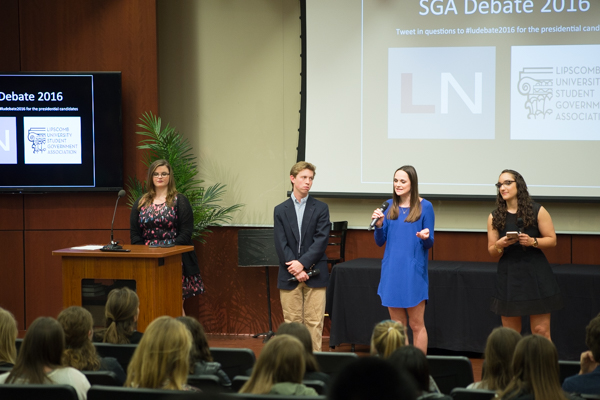Student Government Association candidates offered their ideas from decreasing the cost of summer internships to increasing availability of gluten-free food options at the debate on Monday night in Stowe Hall.
Moderator Becca Risley opened up the night by introducing each candidate and allowing them to share their platforms.
Running unopposed, Treasurer candidate Sarah Lavoie greeted the audience with a wave and a smile, while Secretary candidates Caroline Hensley and Vince Law shared a few ideas they would each implement or continue if elected.
Vice Presidential candidates Matt Gibson, Carson Panovec and Sinny Chan Chan shared their passion for Lipscomb’s unique campus. Each candidate spoke about the ways he or she would pour into the student body through food service improvements, library hour extension and events to foster relationship building.
Risley posed the following questions to the three presidential candidates Jackson Smith, Katie Scholl and Anna Cannone.
Q: “What would be your main priority to support student life on campus? What is most lacking on campus and how would you address it?”
A: Jackson Smith said he wants to improve communication between student life offices and campus ministry to encourage more student participation in events.
“I’d like to bridge a gap between the Joshua Project and student life to make a mentorship program for students who have gone through disciplinary procedure,” Smith said. “I’d like to plant seeds to actually be able to help them in the future.”
A: Katie Scholl said she hopes to merge the different “pockets” of students on campus through advertising and mixers.
“People are always going to have their closest group of friends, but I think through encouraging students to attend different types of events outside their comfort zone through incentives and more advertising, it would be great to mix it up more,” Scholl said.
Q: “Are there any specific initiatives you would implement to strengthen the gap between students and administration?”
A: Anna Cannone said she hopes she can help students get to know their professors better and feel like they can openly collaborate any time.
“It’s a two way street. We, as students, can go to faculty and staff, but they can also come to us,” Cannone said. “I’d present it as an opportunity to be more open because the office doors really are open for us to talk.”
A: Scholl said she thinks communication is the key to unification.
“I know before I was on SGA, I had ideas but I didn’t necessarily know who to get those ideas to to get them enacted,” she said. “I think having an SGA ‘listen session’…or an email address that students could send ideas to and direct questions to would help close the communication gap.”
A: Smith said he hopes to give students with ideas a voice in administrative meetings.
“I know a lot of times students have ideas but often get caught up in a paper trail working with administration,” he said. “I want to give students the opportunity to say, ‘this is something we’re passionate about, what do we need to do?’”
After several formal debate questions, Risley read questions that students had tweeted in during the course of the evening.
Q: “What is your take on integrated and engagement courses?”
A: Scholl said her engagement course helped her learn vital leadership skills, but understood many engagement sections meet student scrutiny.
“I did my engagement course through Summit, which was a more interactive way of learning, but I also think that there was no need for that class to be in Rome, Georgia,” she said. “It could have had the same impact here.”
A: Cannone emphasized the difficulty of her engagement course, but said the hard work helped her learn. Informing students on the heart behind engagement courses, she said, would help motivate them.
“I think to be educated on [the reasons] behind the courses and know the purpose of why we do that, we could help our student body do well in them.”
Q: “Do you believe students of different religions should have to earn 30 chapel credits?”
A: Cannone said she strongly supports the number of chapel credits required for students of any ethnicity or religion.
“There’s a ton of different people here and though it may not seem like we’re diverse, we are diverse,” Cannone said. “We need to cater to knowing that there’s different types of people here while still saying we’re founded on Christian beliefs at our core.”
“Yes we still need to get that chapel credit, but I would like to see different ways available to achieve it,” she said.
A: Smith agreed with Cannone, saying he believes people can learn about topics beyond Christianity in chapel.
“There are a lot of things that you can take away, not just from a Christian perspective, but from a humanitarian perspective,” Smith said. “We provide some awesome opportunities to hear from great speakers.”
Current SGA President Jordan Beale helped students get to know each candidate more personally by asking about their favorite memories at Lipscomb.
Smith responded that he loves welcoming students to campus through his involvement with the Quest Team.
Scholl said spending time working with the IDEAL program through peer mentoring has been the highlight of her experience.
Cannone said she will never forget the way students encouraged her, prayed for her and later welcomed her back to school after she had to drop out for a semester due to medical issues.
Students can vote for SGA officers—five senators from their respective class and one executive officer per position—on Tuesday in Bennett Campus Center from 9 a.m. to 2 p.m. Runoffs will be held Thursday, April 14.
Elections for Senator-at-large will be held Tuesday, April 18.
Photos by Erin Franklin

